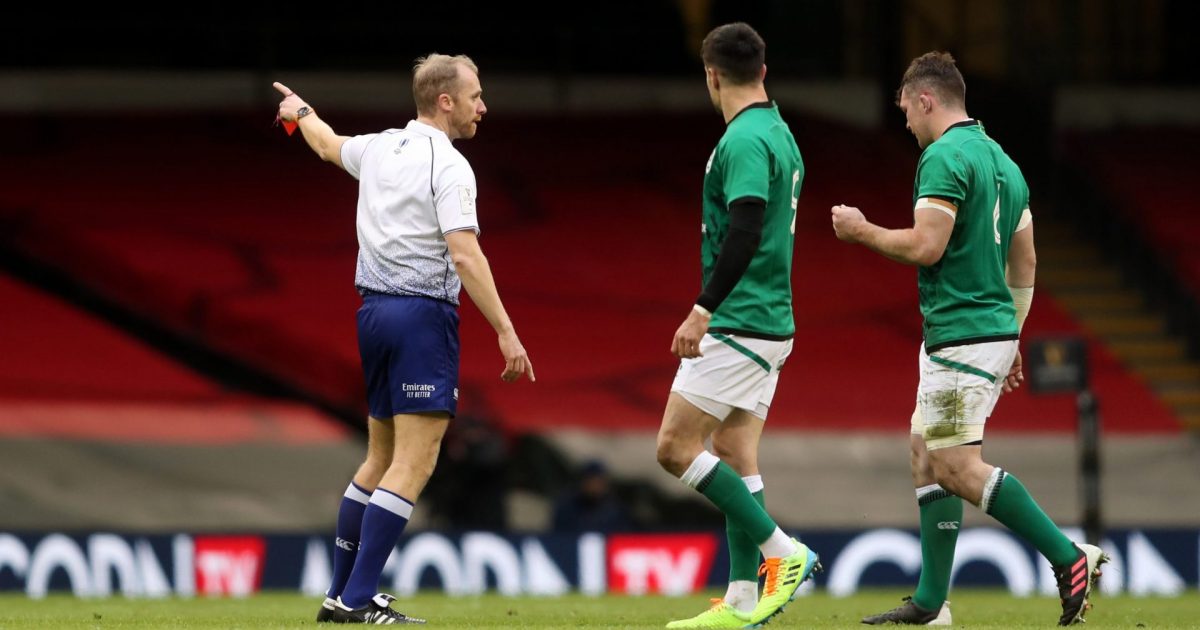Ref Watch: Wayne Barnes' reaction to doling out red card told own story

In a new feature, former referee Paul Smith looks at the refereeing performances of officials during each Six Nations match. Here Paul looks at Wayne Barnes.
Wales v Ireland – Wayne Barnes (England)
With Wales head coach Wayne Pivac under huge pressure and Ireland seeking to build on their comfortable Autumn Nations win over Wales and in the process propel themselves into a campaign which brings both France and England to the Aviva Stadium, the appointment of the vastly experienced Wayne Barnes was no great surprise.
And England’s No.1 delivered his usual calmly assured performance in a contest which hinged on the 13th minute dismissal of Ireland’s flanker Peter O’Mahony.
Talking Points
Johnny Sexton’s post-match BBC interview suggested O’Mahoney had not “got the rub of the green” in this incident and that the match contained other not dissimilar head contacts. In truth, outside his most one-eyed fans, Ireland’s captain is unlikely to find many who assent with this view.
There was much to admire from a refereeing perspective about the match officials’ handling of the incident which began with the timing and tone of the intervention from TMO Tom Foley.
Barnes’ real-time view of O’Mahoney’s arrival at the breakdown had been: “It’s a clear-out, totally unavoidable.” However, Foley quickly suggested the veteran official had a second look, from which he reassessed his position to unnecessary and dangerous foul play.
Barnes is a practicing barrister, and his subsequent step-by-step dissection of events being viewed on the giant screen followed recommended protocols to the letter.
“No.6 is arriving and we’ve got a left arm not trying to clear someone out but in a chicken-wing action,” he said. “Let’s deal with the facts. It’s foul play, he’s come from a distance at high speed and hit someone in the head when he’s not in control.”
This commentary served a dual purpose – about which Barnes may or may not have been aware – since he also provided the huge terrestrial TV audience, many of whom only watch rugby during the Six Nations, with the clearest possible explanation for the red card which followed.
Sending a player off in any level of the sport is something referees dread, and it is very easy to struggle with concentration afterwards as you replay the incident over and again in your head. Issuing a red card in the Six Nations – Ireland’s first in the competition’s 21-year history – is clearly a bigger deal than most, so it is a measure of Barnes’s experience and skill that he appeared entirely unaffected by it.
| Quarter 1 | Quarter 2 | Quarter 3 | Quarter 4 | |
| Pens against Wales | 0 | 5 | 1 | 5 |
| Pens against Ireland | 4 (RC) | 0 | 4 | 3 |
What worked and what didn’t
Unlike the previous two round one contests, the scrum was almost immaculate since all ten setpieces completed without penalty and only one required a reset.
Throughout the first hour Barnes regularly reminded the front rows to maintain a good height; when he reviews the match he will doubtless reflect that this approach served him (and the TV viewers) well.
'…despite what social media appears to have determined the Irish official can look back on a job well done.'
In a new feature, Ref Watch, ex-ref Paul Smith 👨💻 looks at each Six Nations refereeing performance. First up, Andrew Brace in #ENGvWALhttps://t.co/EYRCvoNuOr
— RugbyPass (@RugbyPass) February 7, 2021
The veteran whistler is famed for the accuracy of his decision-making, and in this respect his post-match review will focus on the crucial 65th minute penalty awarded in front of the Ireland posts three points from which ultimately pushed the visitors out of range.
Ireland’s Tadhg Beirne had pounced on a ball emerging from a breakdown in close proximity to a Wales player on the ground when Barnes penalised him because the ball was still “in the tackle zone.”
Key questions here are whether Beirne was onside (he was) and whether the ball was either in a ruck (since no players were bound over it no ruck existed) or ‘near to’ a tackle – which law defines as within one metre – which it clearly was.
At this point law 14.9 (b) advises an arriving player: “Must remain on their feet, and not go to ground at or near the tackle unless tackled by the opposition,” which means Beirne’s instinctive drop on the ball was correctly penalised.

























































